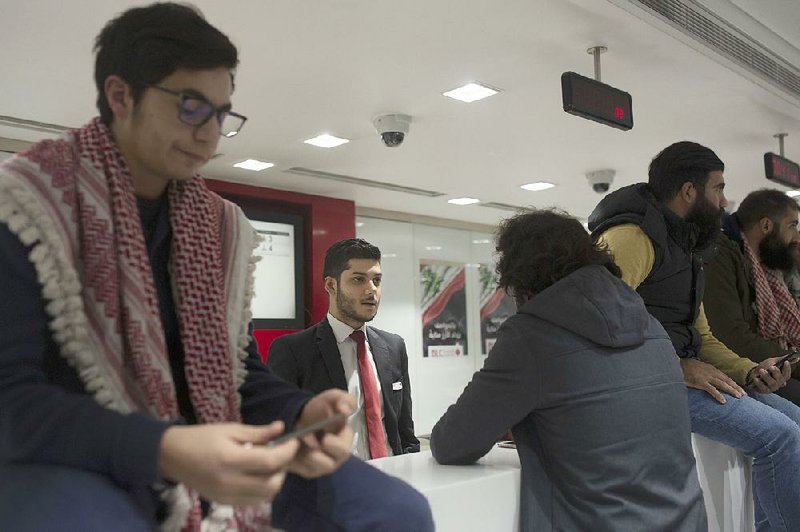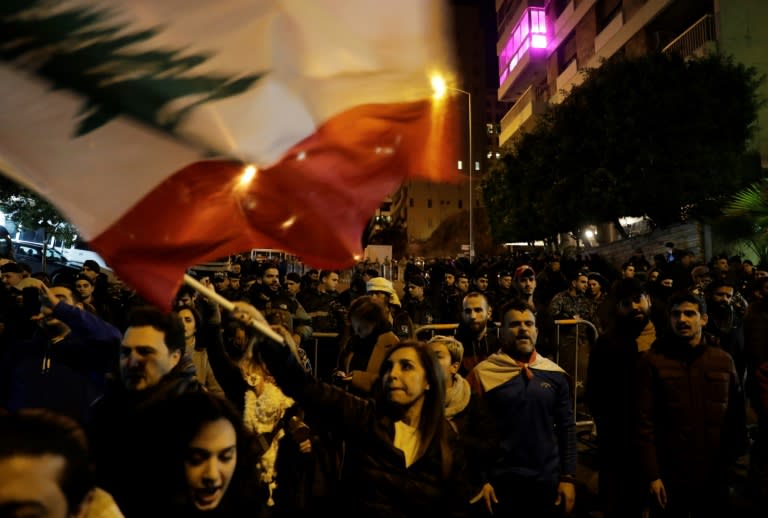BEIRUT ( Sputnik – 31st December, 2019) President of Lebanon Michel Aoun on Tuesday expressed hope that a new Lebanese government will be formed in the coming days. “We are doing everything to overcome the difficulties. But we need society’s support … I hope that a government will be formed in the coming days and […]

TOKYO—Nissan’s former Chairman Carlos Ghosn said on Tuesday he was in Lebanon and was not fleeing justice, but instead sought to avoid “injustice and political persecution” in a criminal trial in Japan for alleged financial misconduct. “I am now in Lebanon, and will no longer be held hostage by a rigged Japanese justice system where guilt is presumed, discrimination is rampant and basic human rights are denied, in flagrant disregard of Japan’s legal obligations under international law and treaties it is bound to uphold,” the statement said. Japanese media quoted prosecutors speaking anonymously who said they did not know how Ghosn had left the country while under surveillance. BEIRUT (Reuters) – The Lebanese government does not know how Nissan ex-boss Carlos Ghosn made it from Japan, where he was due to be tried for financial misconduct, to Lebanon, the foreign ministry said on Tuesday.
A very weird rumor floating around is saying that Carlos Ghosn, the former chairman and CEO of the Renault-Nissan Alliance, escaped Japanese house arrest and fled to Lebanon this past weekend by reportedly hiding in a musical instrument case. Yesterday afternoon, The Washington Post and Financial Times both reported that Ghosn had left Japan and taken a private jet to Lebanon on Sunday, but it was initially unclear whether the accused businessman had arranged something with the conditions of his bail and house arrest with Japanese authorities, or if he had fled the country. We’re a bit skeptical of the piano case rumor as of right now, however, as we’re talking about Japan, a country with fairly strong passport controls, and it’s a wild coincidence that Ghosn escaped right before New Year’s Eve – a very convenient time to bury some less-than-desirable news.
BEIRUT (AP) Zena Karam — Former Nissan chairman Carlos Ghosn, who is awaiting trial in Japan on charges of financial misconduct, has arrived in Beirut, a close friend said Monday. He apparently jumped bail. It was not clear how Ghosn, who is of Lebanese origins and holds French and Lebanese passports, left Japan where he was under surveillance and is expected to face trial in April 2020. Ricardo Karam, a television host and friend of Ghosn who interviewed him several times, told The Associated Press Ghosn arrived in Lebanon Monday morning.. “He is home,” Karam told the AP in a message. “It’s a big adventure.” Karam declined to elaborate. Local media first reported Ghosn arrived in Lebanon, but didn’t offer details. There was no immediate comment from Japan or from Lebanese officials.
Given the lack of an extradition agreement between Japan and Lebanon, the UN Convention against Corruption UNCAC is the sole course of action to trie Ghosn on Lebanese soil. Global anti-corruption treaty enacted in 2009, signed by 141 countries including Japan and Lebanon.”Article 44 and 22 of the UN Convention against Corruption (UNCAC) paves the way to return the accused to face trial in Lebanon if charges apply in both countries,”
Ghosn, 65, has been on bail in Tokyo since April and is facing charges of hiding income and financial misconduct. He has denied the charges. He had been under strict bail conditions in Japan after spending more than 120 days in detention. Lebanon-based paper Al-Joumhouriya said Ghosn arrived in Beirut from Turkey aboard a private jet. AP has not been able to confirm those details or how he was able to leave Tokyo. A house known to belong to Ghosn in a Beirut neighborhood had security guards outside with two lights on Monday night, but no sign otherwise of anyone inside. The guards denied he was inside, although one said he was in Lebanon without saying how he knew that. Ghosn was arrested last year in Japan and has been charged with under-reporting his compensation and other financial misconduct. He denies wrongdoing and was out on bail. His trial had not started.
Ghosn’s lawyers say the allegations are a result of trumped-up charges rooted in a conspiracy among Nissan, government officials and prosecutors to oust Ghosn to prevent a fuller merger with Nissan’s alliance partner, Renault SA of France. Ghosn, one of the auto industry’s biggest stars before his downfall, is credited with leading Nissan from near-bankruptcy to lucrative growth. Even as he fell from grace internationally, Ghosn was still treated as a hero in Lebanon, where many had long held hopes he would one day play a bigger role in politics, or help rescue its failing economy. Politicians across the board mobilized in his defense after his arrest in Japan, with some suggesting his detention may be part of a political or business-motivated conspiracy.

Will you get success in 2020 – 2021 or need to wait for a good time to come? Know all these unanswered queries by reading our yearly horoscope 2020 predictions. Every possible event coming in your life are elaborated in this article based on Vedic Astrology. You would be able to know about your profession, job, wealth, finances, health, education and family life for this coming year 2020. Horoscope 2020 – 2021 also explains that all planets and nakshatras are posited into 12 zodiac signs. Every zodiac sign has its different ruling lords and also in varga charts, any planet placed in any particular sign will influence differently to a person. In that situation, it is necessary to know whether the permutation and combination of planets occurring in that particular year will affect positively or negatively to our different areas of life. We will let you know the most concerning areas of your life in the coming year 2020, which need actions or remedies to be taken. What are the changes and challenges occurring in this year 2020 for you? Which are the moon signs that will gain favourable outcomes this year? You will be able to know all these details through our 2020 horoscope at our site, AstroSage. Let’s know in detail by reading Astrology 2020 – 2021 and get to know your future and remedies to get rid of obstacles coming into your way this year.
by reuters — A Chinese court sentenced the scientist who created the world’s first “gene-edited” babies to three years in prison on Monday, according to the official Xinhua news agency, on charges of illegally practicing medicine. He Jiankui, then an associate professor at Southern University of Science and Technology in Shenzhen, said in November 2018 […]

by MAYA ALLERUZZO The Associated Press — BEIRUT — Dozens of Lebanese protesters held a brief sit-in inside a bank in Beirut and another in the country’s south on Saturday, part of their focus on banking policies they complain are inefficient and corrupt. Lebanon is facing its worst economic crisis in decades, while protests against corruption and mismanagement have gripped the country since October. The local currency has lost more than 40% of its value after more than 20 years of being tied to the dollar. Banks are imposing unprecedented capital controls to protect their deposits amid a deepening confidence crisis. Meanwhile, layoffs and salary cuts are becoming the norm, while politicians argue over forming a new government.
Dozens of protesters entered a private bank in the commercial Hamra district in Beirut, protesting capital controls and insisting that no one would leave without the money they came for. Banks have put a withdrawal ceiling of $200 a week on most accounts, while totally blocking outside transfers. “Thieves! Thieves!” two dozen protesters chanted, some sitting on counters and others on the floor. Bank staff watched and security guards did not interfere. The protesters later helped a woman with a cane get to the second floor, again shouting that she wouldn’t leave until she got the money she needs. The protesters posted videos of their actions on a Twitter account linked to the protest movement.
by naharnet – The Lebanese judiciary has launched an investigation into reports claiming that nine Lebanese politicians have transferred $2 billion abroad over the past 15 days, a media report said. The judicial probe got underway simultaneously with the investigations that are being carried out by the central bank, Asharq al-Awsat newspaper reported Sunday. “Intensive […]

By Ester Carpenter — Five Gen-Zer squatted in early November on a small pile of rubbish in the middle of Martyrerplatz in downtown Beirut. In white gloves, they sorted bottle caps, cigarette butts, mouthpieces for hookahs, adhesive tape and plastic food packaging – all waste of the protests from the previous day. Although the five were students, they had not been in class for 26 days. Some of her teachers were upset, but the activists thought cleaning up after the protests that had hit the country since mid-October was more important than learning. They wanted to show the country how to take care of themselves, said 17-year-old Paul Hanna and took a break from sorting. “Without recycling, most of the garbage goes into the sea.” “We don’t want to see garbage on the street,” said Mira Raheb, also 17. “If we clean here, it will change (the mentality).”
Like youth activists around the world, Lebanese environmentalists reject the status quo, which means in Lebanon to protest against rampant government corruption, a sluggish economy and a long list of environmental issues that dominate everyday life. Hoping to take advantage of the current unrest, they are also working to make the country greener. Since the end of the civil war in the 1990s, Lebanon has not been able to provide its citizens with 24/7 electricity, a functioning public transport network, proper waste disposal, or drinking water. The lack of basic supplies has a particularly severe impact on poor families and working-class families, and the environment also suffers from people turning to diesel-powered generators and relying on plastic water bottles.
Last October, wildfire broke out in a forested area south of Beirut that quickly got out of control and set fire to more than 3,000 acres. Hot, windy conditions played a role, but so did the government’s incompetence (three privately donated fire helicopters were in poor condition at a nearby airport). Five days later, over a million Lebanese were on the streets demanding the government’s resignation. Prime Minister Saad Hariri had resigned until the end of October. “The forest fires were an important forerunner of the revolution.” “The forest fires were an important forerunner of the revolution,” said 36-year-old Adib Dada. As part of the protests, Dada, an environmental architect and biomimics specialist, led a guerrilla gardening project that planted 30 native trees and shrubs in downtown Beirut, a group called Regenerate Lebanon.

By Najia Houssari by eurasiareview.com — Widespread anger at Lebanese banking restrictions boiled over on Saturday when dozens of protesters stormed a Beirut branch following its refusal to deliver employees’ salaries in US dollars. The protest group, made up mainly of Communist Party members, occupied the BLC bank’s Hamra branch and staged a sit-in over what they described as “the false practices of the banks.” Lebanon’s banks have imposed weekly limits on withdrawals of US dollars amid a shortage in liquidity as the country grapples with its worst economic and financial crisis in more than three decades. The restrictions have added to mounting anger over job layoffs, salary cuts and rapidly rising prices. The Communist Party later issued a statement saying that the sit-in resulted in “all customers receiving their money and deposits, which confirms the false practices of the banks, as the administration claimed that the dollar was not available inside the branch, which turned out to be untrue.”
On Thursday, protesters staged a sit-in outside the central bank and the Lebanese Banks’ Association building in protest against the banks’ policies amid unprecedented capital controls. Banks’ strict controls on releasing hard currency have added to the liquidity crisis on top of an economic downturn. Meanwhile, attempts to form a national salvation government stalled after a number of Sunni political figures refused to accept ministerial positions in the leadership. The Future Movement, the largest Sunni parliamentary bloc, is boycotting attempts to establish a new government. Nasser Yassin, acting director of the Issam Fares Institute for Public Policy and International Affairs at the American University of Beirut, told Arab News that he had rejected a request to take up a ministerial position. Yassin described the portfolio as a “suicide mission.” “I am not enthusiastic in the current circumstances,” he said.

by middleeasteye.net — Protesters gathered outside the Beirut home of Lebanon’s new prime minister on Saturday, calling for Hassan Diab’s resignation less than 10 days after he was appointed. Lebanon is without a cabinet and in the grips of a deepening economic crisis after a two-month-old protest movement forced Saad Hariri to stand down as prime minister on 29 October. Anti-government protests continued after Hariri’s resignation, while political parties negotiated for weeks before nominating Diab, a professor and former education minister, to replace him on 19 December, AFP said.
Echoing protester demands, Diab promised to form a government of independent experts within six weeks – in a country where appointing a cabinet can take months. But protesters on Saturday were unconvinced by his promise. “We’re here to bring down Hassan Diab. He doesn’t represent us. He’s one of them,” said one young demonstrator, referring to the country’s ruling elite, who protesters despise collectively. Lina, another protester agreed, saying: “It’s the revolution that must name the prime minister, not them.” The 60-year-old Diab, who has a low public profile and styles himself as a technocrat, last week called protester demands legitimate but asked them to give him a chance to form “an exceptional government”. “We are willing to give him a chance, but let us at least give him a roadmap,” Lina told AFP. The protests and political deadlock have brought Lebanon to its worst economic crisis since the 1975-1990 civil war. The international community has urged a new cabinet be formed swiftly to implement economic reforms and unlock international aid. Lebanon urgently needs a new government to pull it out of the long-brewing crisis. Foreign donors say they will only help after there is a cabinet that can enact reforms, Reuters reported. Lebanon is grappling with its worst economic crisis in decades and battered confidence in its banking system. The risk of devaluation has risen in a country with one of the world’s biggest foreign debt burdens.
Foreign debt burden

by albawaba.com — A probe has started into the billions of dollars sent overseas from Lebanon amid a political crisis that has gripped the country for months, with the country’s central bank chief warning that “nothing can disappear.” Lebanon is experiencing a severe liquidity crunch in light of an economic downturn, political gridlock and massive protests, factors that have triggered a crisis of confidence inside and outside the country. Banque du Liban governor, Riad Salamé, said: “People may do as they please with their money, but if suspicious funds were transferred in 2019, we will investigate them, and investigations start in Lebanon. We will do whatever we are legally permitted to do to verify all the transfers that took place. Nothing can disappear. The central bank is addressing the gradual crisis, and we hope the decisions we have taken to increase the banks’ capital will help the country recover so that the economy can improve.” He did not blame civil society for the deterioration of the Lebanese lira’s exchange rate against the dollar. After Oct. 17, the date on which the protests erupted, he said that the banks closed for two weeks and it was this shuttering that created turmoil in the financial market.
The dollar’s exchange rate at shops has reached 2,100 liras, but Salamé said there was no change in the official rate which is set at 1507.50. A parliamentary finance and budget committee said overseas remittances worth billions of dollars were made from Lebanese banks. “Approximately $11 billion of bank money has ended up overseas,” said MP Hassan Fadlallah, while committee head Ibrahim Kanaan said Lebanese people’s concerns over the domestic situation had led to the withdrawal of $6 billion from banks. People braved bitter conditions to protest outside a banking association’s headquarters and Banque du Liban branches. There is a campaign to confront banks withholding the money of small depositors. Protesters urged people to stop making loan repayments, condemning banking policies and corruption. Security measures around banks have failed to deter anger, with people demanding money and salaries from staff.



